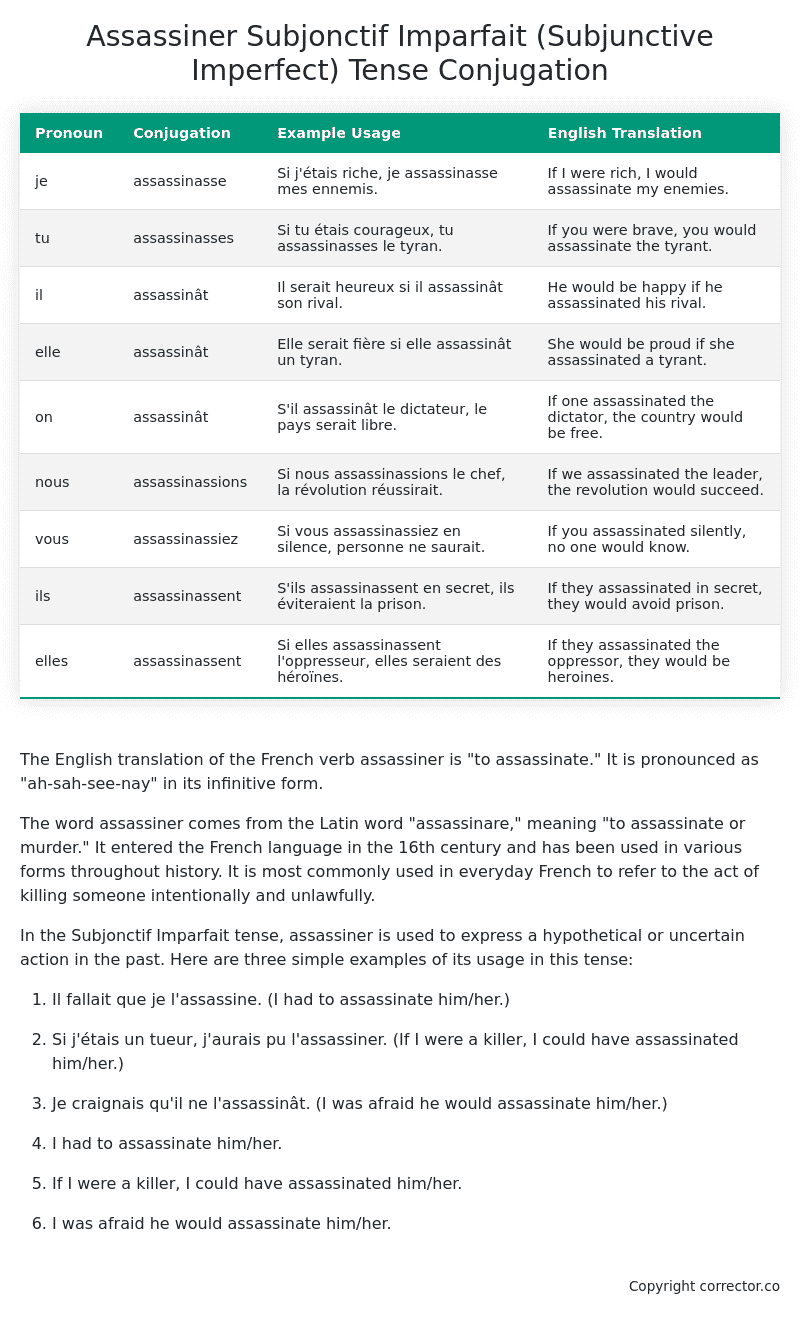Subjonctif Imparfait (Subjunctive Imperfect) Tense Conjugation of the French Verb assassiner
Introduction to the verb assassiner
The English translation of the French verb assassiner is “to assassinate.” It is pronounced as “ah-sah-see-nay” in its infinitive form.
The word assassiner comes from the Latin word “assassinare,” meaning “to assassinate or murder.” It entered the French language in the 16th century and has been used in various forms throughout history. It is most commonly used in everyday French to refer to the act of killing someone intentionally and unlawfully.
In the Subjonctif Imparfait tense, assassiner is used to express a hypothetical or uncertain action in the past. Here are three simple examples of its usage in this tense:
-
Il fallait que je l’assassine. (I had to assassinate him/her.)
-
Si j’étais un tueur, j’aurais pu l’assassiner. (If I were a killer, I could have assassinated him/her.)
-
Je craignais qu’il ne l’assassinât. (I was afraid he would assassinate him/her.)
-
I had to assassinate him/her.
-
If I were a killer, I could have assassinated him/her.
-
I was afraid he would assassinate him/her.
Table of the Subjonctif Imparfait (Subjunctive Imperfect) Tense Conjugation of assassiner
| Pronoun | Conjugation | Example Usage | English Translation |
|---|---|---|---|
| je | assassinasse | Si j’étais riche, je assassinasse mes ennemis. | If I were rich, I would assassinate my enemies. |
| tu | assassinasses | Si tu étais courageux, tu assassinasses le tyran. | If you were brave, you would assassinate the tyrant. |
| il | assassinât | Il serait heureux si il assassinât son rival. | He would be happy if he assassinated his rival. |
| elle | assassinât | Elle serait fière si elle assassinât un tyran. | She would be proud if she assassinated a tyrant. |
| on | assassinât | S’il assassinât le dictateur, le pays serait libre. | If one assassinated the dictator, the country would be free. |
| nous | assassinassions | Si nous assassinassions le chef, la révolution réussirait. | If we assassinated the leader, the revolution would succeed. |
| vous | assassinassiez | Si vous assassinassiez en silence, personne ne saurait. | If you assassinated silently, no one would know. |
| ils | assassinassent | S’ils assassinassent en secret, ils éviteraient la prison. | If they assassinated in secret, they would avoid prison. |
| elles | assassinassent | Si elles assassinassent l’oppresseur, elles seraient des héroïnes. | If they assassinated the oppressor, they would be heroines. |
Other Conjugations for Assassiner.
Le Present (Present Tense) Conjugation of the French Verb assassiner
Imparfait (Imperfect) Tense Conjugation of the French Verb assassiner
Passé Simple (Simple Past) Tense Conjugation of the French Verb assassiner
Passé Composé (Present Perfect) Tense Conjugation of the French Verb assassiner
Futur Simple (Simple Future) Tense Conjugation of the French Verb assassiner
Futur Proche (Near Future) Tense Conjugation of the French Verb assassiner
Plus-que-parfait (Pluperfect) Tense Conjugation of the French Verb assassiner
Passé Antérieur (Past Anterior) Tense Conjugation of the French Verb assassiner
Futur Antérieur (Future Anterior) Tense Conjugation of the French Verb assassiner
Subjonctif Présent (Subjunctive Present) Tense Conjugation of the French Verb assassiner
Subjonctif Passé (Subjunctive Past) Tense Conjugation of the French Verb assassiner
Subjonctif Imparfait (Subjunctive Imperfect) Tense Conjugation of the French Verb assassiner (this article)
Subjonctif Plus-que-parfait (Subjunctive Pluperfect) Tense Conjugation of the French Verb assassiner
Conditionnel Présent (Conditional Present) Tense Conjugation of the French Verb assassiner
Conditionnel Passé (Conditional Past) Tense Conjugation of the French Verb assassiner
L’impératif Présent (Imperative Present) Tense Conjugation of the French Verb assassiner
L’infinitif Présent (Infinitive Present) Tense Conjugation of the French Verb assassiner
Struggling with French verbs or the language in general? Why not use our free French Grammar Checker – no registration required!
Get a FREE Download Study Sheet of this Conjugation 🔥
Simply right click the image below, click “save image” and get your free reference for the assassiner Subjonctif Imparfait tense conjugation!

Assassiner – About the French Subjonctif Imparfait (Subjunctive Imperfect) Tense
Formation
Common Everyday Usage Patterns
Interactions with Other Tenses
Subjonctif Présent
Indicatif Passé Composé
Conditional
Conditional Perfect
Summary
I hope you enjoyed this article on the verb assassiner. Still in a learning mood? Check out another TOTALLY random French verb conjugation!


